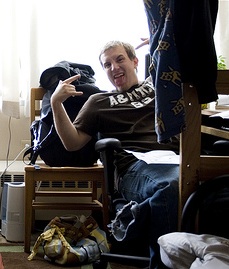
Rites of passage as a new college student often involve wandering lost around campus, sampling the mystery meat in the dining hall, and – that first awkward social encounter – meeting your roommate. At least that’s how it used to be. The Atlantic shares a new trend in college life, the single dorm room.
More and more schools are offering single room options, bypassing the awkward roommate relationship navigation that has been one of the hallmarks of college life. One university even converted its double occupancy dorms into “super singles.” Having your own room does ensure privacy, personal space, and avoidance of bad roommates, but students and experts are lamenting the loss of the college roommate.
One student explains potential problems saying:
With a private room, it’s very easy to find yourself cut off from a social life. If you just go back to your room as soon as class is over, you’re never going to meet anyone new or have any experiences beyond those in the classroom.
There is more at stake than an invitation to parties; having a social life includes learning how to interact with people of many cultures and backgrounds. Learning how to navigate the social world is crucial for young adults. Sociologist and social sciences dean at New York University Dalton Conley agrees that the loss of the college roommate could be very detrimental.
“Roommates simply teach us to be tolerant and adapt,” Conley says. “In our increasingly customized, digitized, on-demand world, there are not many experiences that provide this sort of socialization.”
![]()

Comments 2
doug hartmann — February 28, 2014
Interesting! There's another great sociologist cited in the piece talking about how having roommates can have positive effects. Here it is: "For example, sociologist David R. Harris found in a 2002 American Sociological Review study that white students who were paired up with non-white roommates ended up more open-minded about race."
Friday Roundup: February 28, 2014 » The Editors' Desk — February 28, 2014
[…] A (Private) Room with a View on Citings and Sightings […]